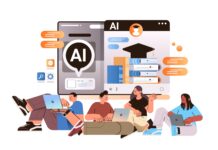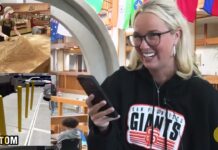
Nestled within the main hallway of the South City Campus is the television and radio production program, which has become a hub for journalism and digital media students at Salt Lake Community College.
Beyond developing necessary communication skills, students enrolled in these classes are learning to master tools that did not exist a decade ago — tools like digital production boards and the use of artificial intelligence.
Taught by adjunct professor Scot Singpiel, COMM 1560, Radio Production and Performance, has been offered on campus since 2008. Singpiel worked as a commercial radio host for more than 20 years before moving to teaching in 2013.
“Most of my work was on the air. I was a morning show host, a night host, a music director, an assistant program director, and a promotions director,” Singpiel said. “I loved radio growing up. When I was a kid, it was vibrant.”
With a background in mass communication, with an emphasis on videography and TV, associate professor Matt Merkel has been teaching at SLCC for 16 years. In addition to COMM 2250, TV Studio Production, Merkel teaches classes on video content creation, social media, and media and society.
Both professors said technology has been the biggest change to the program.
“The biggest evolutions have been in technology of production. Everything is digital,” Merkel said.
Singpiel explained that the courses have evolved to match technology’s demands.
“When I first took [COMM 1560] over, it was very focused on getting a job in radio,” Singpiel said. “I revised it to make it about becoming a better communicator while still keeping career development front and center for those who want it.”
Recently, technology has changed the field for everyone who is interested.
“The biggest changes are in what’s available to the public,” Singpiel said. “Now, you can record high-quality interviews with just a laptop and some affordable software.”
Regarding video production, recent improvements have skyrocketed the program.
“We just put in a new TV production board that would blow your mind,” Merkel said. “But you can take a dart and hit any port of the production workflow that hasn’t been touched by new technology.”
Over the past five years, generative AI has changed the modern landscape, especially the communications field.
At first, AI could be prompted to generate a vaguely similar image to illustrate a sentence. Now, Singpiel explained, generative AI is being used to create videos, podcasts, images and more.
“The key is knowing how to guide AI and then improve what it gives you using the skills we practice in class,” he said.
However, as AI gets better, more people are more prone to misinformation and deepfakes.
“Unless the public is willing to educate itself about what the inherent negatives of AI are and how their media is being made, this will remain the same conundrum that it always has been through centuries,” Merkel said. “AI is just the next snake oil being sold.”
AI has been heavily introduced in educational environments over the past three years. ChatGPT, a popular app, functions as a large language model that draws information from across the Internet to form answers.
Students are already encountering AI in the classroom, raising questions of ethics and authenticity. Singpiel cautioned that as stations cut human voices, they risk losing what made radio special, “authenticity and connection.”
“Positively, it has made content creation easier and more accessible. Students can now do things that used to require expensive studios … AI could accelerate that trend,” he said.
The digital shift has also expanded career paths. SLCC’s program has built connections and opportunities for students with KSL, Fox 13, ABC 4, KRCL, and other stations over the years, but the career titles have changed.
“Multimedia journalism, content creation, social media managers and a lot more freelancing,” Merkel said.
Singpiel agreed, explaining that careers may change, but SLCC’s program gives students a foundation for any path.
“Many of them are becoming YouTubers, podcasters, Twitch streamers, or brand content creators,” Singpiel said. “Some do freelance audio editing or run their own channels. These weren’t common paths even a decade ago, but now they are valid careers.”
Both Merkel and Singpiel explained that freelancing is a new thing for Generation Z. Their classes help students gain direct to short-form content and social media skills.
“Much more freelancing [exists] and we try to prepare our students to be disciplined and self-motivated as these are critical skills when freelancing,” Merkel said. “I try to teach them that all gigs, big and small, teach you things.”
To improve student skills, Merkel said they are trained in multiple roles to get a feel for the industry and be prepared to wear “as many hats as possible.”
“In the larger program, students often get exposure to video production, directing, and visual editing too,” Singpiel said. “That kind of cross-training helps them adapt. The more roles they understand, the more flexible and employable they are.”
No matter if generative AI is here or not, media professionals are still dedicated to their craft.
“Only the tools used to do the creating change,” Merkel said. “I don’t know what those tools might look like in the future, but we will continue to train our students to use them.”
However, when it comes to radio, the change is very drastic. Singpiel explained that radio changed following the 1996 Telecommunications Act.
“Ownership limits were loosened, and stations started consolidating,” he said. “That led to more automation and fewer local voices. AI could be the next big shift. I think more stations will use AI DJs. These systems can be programmed with local information, generate content, and deliver it in a human-sounding voice.”
Both professors warned students about emerging trends.
“Voice cloning. It’s getting easier and more convincing, and it could reshape how talent is used in media,” Singpiel said.
Merkel warned students about the “use and misuse of AI.”
Both professors shared that no matter what technology emerges, video and audio production students have a future in media. Singpiel advised students to develop their voice.
“Know what you want to say, and understand who you are talking to,” Singpiel said. “That applies whether you are on the radio, doing a podcast or posting on TikTok. Communication matters. Authenticity matters. Technology will keep changing. But if you can connect with people, you’ll always have a place in this field.”
“Just take every job, whether it is working a board on a podcast or shooting b-roll, it will all teach you something,” Merkel added. “Take a chance on yourself. We are here to support you.”






